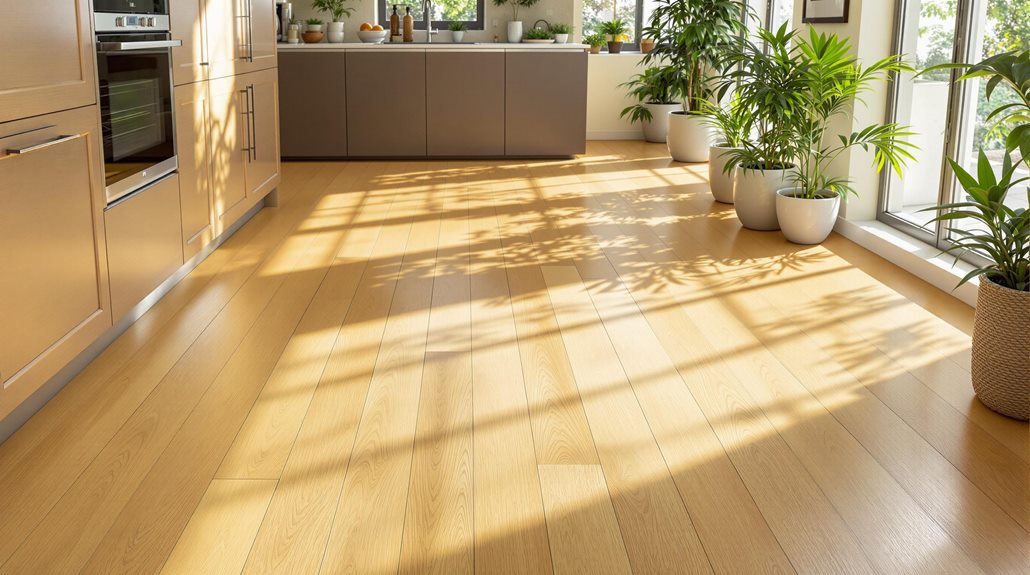What Is the Most Eco Friendly Kitchen Flooring?

Cork flooring is your best choice for an eco-friendly kitchen floor. It's harvested sustainably from cork oak tree bark without harming the trees, which continue producing bark for future harvesting. You'll benefit from cork's natural water resistance, antimicrobial properties, and superior insulation - all while reducing your environmental impact. The material's durability means you won't need frequent replacements, and it provides excellent cushioning underfoot for comfort during long cooking sessions. Whether you're remodeling or building new, cork's versatility offers numerous style options while other sustainable flooring alternatives present their own unique advantages worth exploring.
Understanding Sustainable Kitchen Flooring Materials
When it comes to creating an eco-friendly kitchen, your choice of flooring material plays an essential role in reducing environmental impact. Today's Green Flooring options offer various sustainable solutions that combine durability with environmental responsibility.
Linoleum floors, made from natural linseed oil extracted from flax plants, provide an environmentally conscious choice that can last over two decades. You'll find cork flooring particularly appealing if you're looking for a material that's not only renewable but also naturally resistant to bugs, mold, and mites while providing excellent insulation properties.
For traditionalists, hardwood flooring certified by the Forest Stewardship Council guarantees your floors come from responsibly managed forests. Bamboo offers another excellent option, with its impressive 3-5 year harvest cycle making it one of the most renewable choices available. If you're considering natural fiber alternatives, eco-friendly carpeting made from wool, jute, or seagrass provides sustainable solutions at competitive price points.
Each of these materials offers unique benefits while maintaining environmental responsibility. You'll find pricing ranges from $1.50 to $12 per square foot, depending on your chosen material, making sustainable flooring both accessible and practical for most budgets.
Natural Cork Benefits
A sustainably harvested cork floor brings exceptional comfort and environmental benefits to your kitchen space. As one of the most eco-friendly flooring options available, cork is made from natural materials harvested from the cork oak tree bark, which grows back every nine years without harming the tree. You won't find toxic chemicals in this sustainable material, making it a healthy choice for your home.
When you're considering kitchen flooring that's both environmentally conscious and practical, cork offers impressive advantages:
- It's naturally insulating, helping you save on energy costs by maintaining comfortable room temperatures
- Being water-resistant and easy to clean, it's perfect for busy kitchens where spills are common
- The material is inherently antimicrobial and repels mold, contributing to better indoor air quality
Your feet will thank you for choosing cork, as its natural cushioning properties reduce fatigue during long cooking sessions. Unlike some made from recycled materials that sacrifice quality, cork flooring maintains its durability while providing superior comfort. You'll also appreciate how it resists pests and moisture, ensuring your kitchen floor stays beautiful and functional for years to come.
Linoleum's Environmental Impact

Linoleum's natural composition makes it a standout choice for environmentally conscious homeowners. When you're trying to make a big difference in your kitchen's environmental impact, understanding the right flooring option is pivotal. With limited data on many synthetic alternatives, linoleum's eco-friendly profiles to select personalised solutions stand out clearly.
You'll find that linoleum's production process has minimal environmental impact, using natural ingredients like linseed oil, pine rosin, wood flour, and cork dust. Manufacturers create profiles for personalised production methods that maximize efficiency while maintaining quality. Unlike synthetic materials that require extensive processing, linoleum's manufacturing creates an object where legitimate interest in sustainability meets practical application.
Recycled Glass Tile Options
Recycled glass tiles offer a brilliant solution for eco-conscious homeowners seeking sustainable kitchen flooring. When you make the choice to use these tiles, you're not just getting a beautiful floor - you're helping to reduce landfill waste and lower greenhouse gas emissions. Partners process data from recycled post-consumer glass to create these durable tiles, converting waste into stunning design elements.
You'll find these tiles particularly appealing because they:
- Use limited data and energy during manufacturing compared to traditional ceramic tiles
- Store and/or access information about their environmental impact through LEED certification programs
- Use profiles to select from an extensive range of colors and patterns for personalized designs
The unique IDs in cookies help track the environmental benefits of choosing recycled glass tiles, while cookies to process personal preferences guarantee you get exactly the look you want. These tiles select personalised advertising through their appearance alone - their gleaming surfaces and creative patterns make a statement about your commitment to sustainability. They're also incredibly practical, offering superior stain resistance and easy maintenance. Whether you're aiming for LEED certification or simply want to reduce your environmental footprint, recycled glass tiles deliver both style and sustainability.
Bamboo Flooring Sustainability

While recycled glass tiles exemplify modern sustainability, bamboo flooring represents nature's renewable miracle for your kitchen. Unlike traditional types of wood that take decades to mature, bamboo reaches harvest-ready status in just 3-5 years, making it one of nature's most sustainable flooring options.
When you're faced with limited data to select from the wide range of eco-friendly flooring options, bamboo stands out for several reasons. Unlike the bark of the cork or hardwood alternatives, bamboo is actually a grass species that regenerates quickly without requiring replanting. You'll find bamboo flooring doesn't just match hardwood's durability - it often surpasses it. The material's natural water resistance makes it particularly suitable for kitchen environments.
While various manufacturers process personal data and create profiles for personalised advertising of their flooring products, it's important to focus on data from different sources regarding bamboo's environmental impact. You'll want to select personalised content that emphasizes locally sourced bamboo options, as these minimize transportation emissions. Many manufacturers now offer bamboo flooring produced through low-impact processes, certified free of harmful chemicals, making it an environmentally responsible choice for your kitchen.
Local Hardwood Sourcing
For environmentally conscious homeowners, locally sourced hardwood flooring presents an appealing alternative to imported options. When you make certain to choose hardwood from your region, you'll substantially reduce transportation emissions while supporting local economies. Your right to object to imported materials becomes easier to exercise when you accept or manage your flooring choices through local suppliers.
To protect your legitimate interest in sustainable flooring, consider these essential aspects of local hardwood sourcing:
- Look for FSC-certified forests in your area, which guarantees your choices will be signaled to responsible harvesting practices
- Select species like oak or maple that are native to your region, including your right to verify their origin
- Consider reclaimed or salvaged hardwood from local demolition projects, which gets signaled to our partners as a sustainable choice
The time in the privacy of your kitchen is better spent on flooring that's built to last. Local hardwood can be refinished multiple times, extending its lifespan for decades. By maintaining your floors properly, you'll create a sustainable solution that benefits both your home and the environment while supporting regional forestry practices.
Eco-Friendly Installation Methods

Installing eco-friendly flooring demands careful attention to both materials and methods that minimize environmental impact. You'll want to prioritize low-VOC adhesives and proper subfloor preparation to ensure your sustainable flooring performs optimally while protecting indoor air quality. By choosing installation techniques that conserve resources, you're making a significant difference in your kitchen's environmental footprint.
When installing your eco-friendly kitchen flooring, focus on avoiding harmful materials and properly disposing of construction waste. Make recycling packaging materials a standard practice throughout the installation process. You'll also need to consider the right underlayment, which enhances both thermal and acoustic insulating properties of your flooring, contributing to better energy efficiency in your kitchen.
To achieve the best results, work with contractors who understand appropriate installation methods for eco-friendly materials. They should follow manufacturer guidelines specific to sustainable flooring products, ensuring your investment lasts longer and maintains its environmental benefits. This expertise is essential as different eco-friendly materials may require unique installation approaches to maximize their performance and longevity while minimizing waste and environmental impact.
Maintenance For Long-Term Sustainability
Maintaining your eco-friendly kitchen flooring up to its highest potential requires a combination of daily care and preventive measures. Whether you love cork, bamboo, or linoleum, implementing proper maintenance routines will help you manage your choices effectively and maximize their lifespan. Regular sweeping and damp mopping with pH-neutral cleaners are essential parts of this care routine.
To help you create profiles to personalize your maintenance approach, consider these vital steps:
- Address spills immediately to prevent staining and damage, particularly with natural materials like cork, which can be sensitive to moisture
- Rotate floor mats and area rugs regularly to guarantee even wear patterns across your flooring's surface
- Conduct monthly inspections to spot potential issues before they become major problems
Understanding the pros and cons of different cleaning combinations of data will help you make informed decisions about your flooring care. As part of the Dotdash network's commitment to sustainability, we recommend avoiding harsh chemicals that can compromise your flooring's eco-friendly properties. By following these maintenance guidelines and checking your List of Partners for approved cleaning products, you'll extend your sustainable flooring's life greatly.




